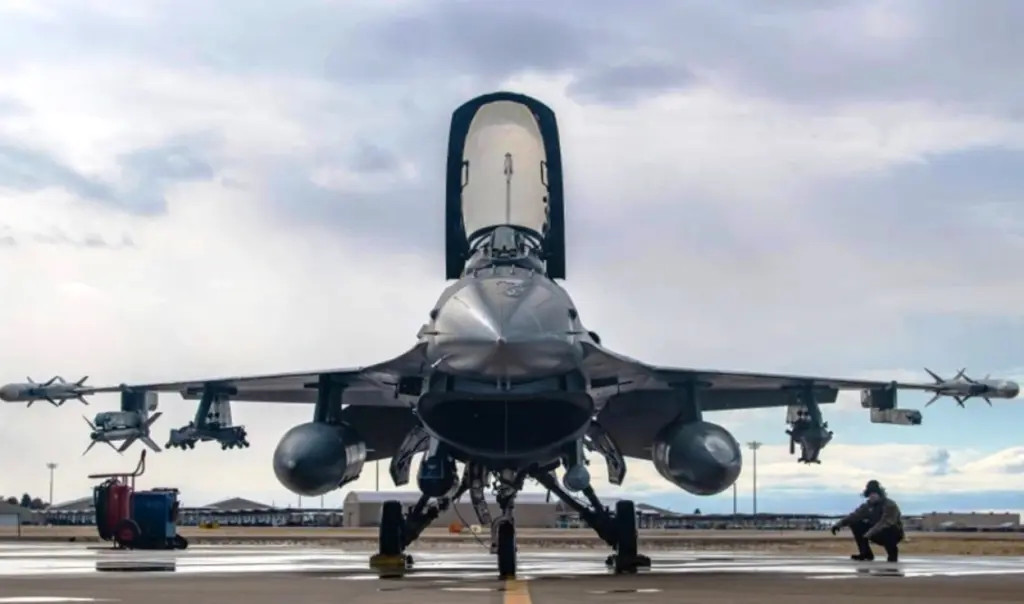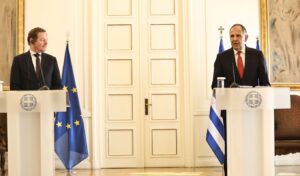Turkey appears ready to penetrate deeper into the European defense market, as Brussels confirmed yesterday that they have received its official request to participate, as a third country, in the SAFE program. Taking advantage of the “window” offered by the regulation for the inclusion of non-EU countries, Ankara is attempting to capitalize on the rapid development of its defense industry and expand the already significant client base it has in the Old Continent.
Ankara does not hide that it is pursuing new defense deals and now treats Europe not only as a potential supplier –with the Eurofighter Typhoon fighters being a characteristic and most recent example– but also as a promising market for “made in Turkey” systems. According to reports from the International Institute for Strategic Studies (IISS) published towards the end of 2024, certain European and NATO countries appear more willing than others to conclude agreements with Turkey. In the report titled “Turkiye’s Defence Industry: Which Way Forward?”, IISS analysts single out Italy and Spain as “among the most willing” to proceed with further cooperation, while prospects with Poland, Romania and the United Kingdom are also recorded positively.
Advanced cooperation between Turkey and Italy and Spain
Turkey’s cooperation with Italy and Spain in the defense sector has already covered significant ground. For Rome, indicative examples include the T129 ATAK attack helicopters, the Turkish coast guard patrol vessels built with Fincantieri’s assistance, as well as the Tulpar main battle tanks, a product of cooperation between Otokar and Leonardo, while more recently Turkish Baykar proceeded with the acquisition of Piaggio Aerospace. For Madrid, the dominant example is the amphibious assault ship TCG Anadolu –of Spanish design and Turkish ownership– built by Sedef and Navantia based on the Juan Carlos I helicopter carrier model, while ties have extended to other programs, such as the CN235 and A400M transport aircraft. Italy and Spain are not, however, the only European capitals turning to the Turkish defense industry. The list of countries that have already proceeded with purchases or are in the process of related negotiations includes Romania, Poland, the Netherlands, Estonia, North Macedonia, Kosovo, Albania, Slovenia, Montenegro and Hungary, thus expanding Ankara’s circle of partners.
SAFE: Turkey’s strong defense industry and European agreements
The meteoric rise of the Turkish defense industry was extensively covered in a recent Le Figaro report, which emphasized that Ankara is now on track to transform into an autonomous military power. Under the title “UAV, missiles, warplanes: Turkey on the road to military power”, the French newspaper records progress in systems such as the Bayraktar TB3, the Kızılelma fighter and the TCG Anadolu, while also highlighting cooperation with Italy’s Leonardo. Particular reference is made to Recep Tayyip Erdogan’s son-in-law and “father” of Turkish drones, Selçuk Bayraktar, who is presented as a “national hero” and symbol of the country’s technological rise. According to data cited by Le Figaro, in 2024 Turkey exported defense equipment worth $7.1 billion to 185 countries – a 29% increase compared to 2023 – while it now produces 80% of its weapons, drastically reducing its dependence on foreign sources.
To date, Turkish participation in defense competitions linked to the EU remains limited, as it focuses mainly on cooperation with individual member states rather than programs directly funded by Brussels. Although it does not belong to the “27”, Ankara is considered an important partner with an active presence in various defense programs. It is worth noting, however, that unlike other countries with which the EU has signed Security and Defense Agreements, a corresponding cooperation framework with Turkey has not been concluded.
SAFE program: Security “safeguards” and Turkey’s “loophole”
Regarding SAFE specifically, the regulation provides for specific restrictions on third country participation, as in Turkey’s case. Confirming yesterday that Brussels has received Ankara’s relevant request, Commission spokesperson Thomas Regnier was called upon to comment on the security “safeguards” in cases of countries –even candidate countries– that threaten member states or Union interests. Mr. Regnier limited himself to assuring that “naturally we have safeguards”, without mentioning Turkey by name, while clarifying that “there are provisions for protecting our member states and our industry”. He even referred to Article 16 of the regulation, which allows for the exclusion of a state that opposes the security interests of a member state or the EU as a whole. In the regulation, however, there is a “loophole” that Ankara appears willing to exploit: the acquisition of companies in EU member states, so that through them it can acquire know-how and use them as “satellites” for transfers or sales of weapons systems. The most characteristic case is Italy, where Turkish Baykar acquired Piaggio Aerospace, while particular importance is also attributed to Leonardo, which participates in the Eurofighter program.
Athens’ veto on the table
The Greek government has made it clear that candidate countries, such as Turkey, must fully align with the EU’s Common Foreign and Security Policy in order to gain access to SAFE funds. From the first moment the European defense program was presented, Athens has announced in all tones that it will not consent to any form of Turkish involvement –even through companies– if Ankara does not take substantial de-escalation steps, with the primary demand being the lifting of the casus belli. It simultaneously reminds that third country participation in SAFE requires the unanimous consent of all member states, which gives it the right to exercise a veto. At the 89th Thessaloniki International Fair press conference, Prime Minister Kyriakos Mitsotakis repeated the message to Ankara: “Regarding the casus belli issue, it has been thirty years since 1995 when the Turks voted for this unacceptable threat. If we really want normalization of Greek-Turkish relations, the casus belli must be revoked by Turkey. Let me repeat that as long as the casus belli exists, Greece will block Turkey’s participation in the SAFE program”.




